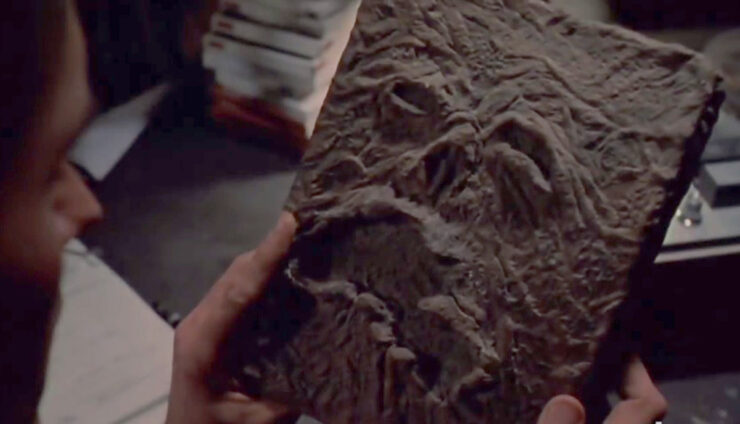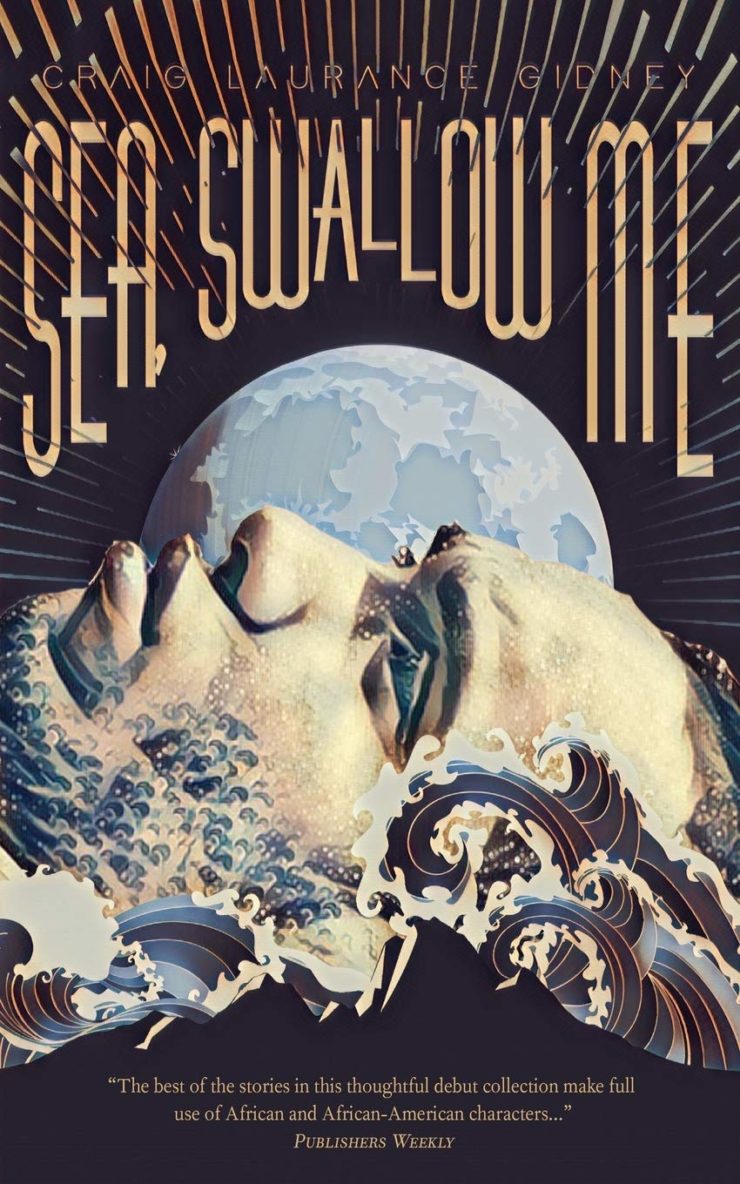Today we’re digging into the archives of the Lovecraft reread, with a look back at three seasonal poems from H.P. himself: “Christmas,” “Festival,” and a holiday greeting to Frank Belknap Long’s cat. Spoilers ahead, assuming you can spoil a plotless poem.
Christmas
The cottage hearth beams warm and bright,
The candles gaily glow;
The stars emit a kinder light
Above the drifted snow.
Down from the sky a magic steals
To glad the passing year,
And belfries sing with joyous peals,
For Christmastide is here!
Festival
There is snow on the ground,
And the valleys are cold,
And a midnight profound
Blackly squats o’er the wold;
But a light on the hilltops half-seen hints of feastings unhallow’d and old.
There is death in the clouds,
There is fear in the night,
For the dead in their shrouds
Hail the sun’s turning flight,
And chant wild in the woods as they dance round a Yule-altar fungous and white.
To no gale of earth’s kind
Sways the forest of oak,
Where the sick boughs entwin’d
By mad misteltoes choke,
For these pow’rs are the pow’rs of the dark, from the graves of the lost Druid-folk.
And mayst thou to such deeds
Be an abbot and priest,
Singing cannibal greeds
At each devil-wrought feast,
And to all the incredulous world shewing dimly the sign of the beast.
Christmas Greetings to Felis (Frank Belknap Long’s Cat)
Little Tiger, burning bright
With a subtle Blakeish light,
Tell what visions have their home
In those eyes of flame and chrome!
Children vex thee—thoughtless, gay—
Holding when thou wouldst away:
What dark lore is that which thou,
Spitting, mixest with thy meow?
What’s Cyclopean: The Yule-altar is fungous! Clearly we’re getting a late frost this year. Or very hardy mushrooms.
The Degenerate Dutch: We love you all, but not enough to read that poem.
Mythos Making: Could “Festival” be another take on the rites described in “The Festival”? These honestly seem much more sedate, maybe closer to the services observed by the Outer Ones in “Whisperer in Darkness.”
Cats, of course, are always heroic in the Mythos—if sometimes viciously so. Probably best to listen to the dark lore that Felis is spitting.
Libronomicon: Little Felis earns a Blakean shout-out.
Madness Takes Its Toll: Something truly terrible must be encrypted in the simple verses of “Christmas.” It’s simply not plausible that the master of horror himself meant to extend unproblematic holiday cheer to his correspondents… or is it?
Anne’s Commentary
All right, let it never be said that Lovecraft is unfailingly gloomy—at least not until our second poem. “Christmas” would feel right at home between the cozy covers of a Hallmark card, fronted with a picture of that cottage, candles in the diamond-paned windows, glitter-strewn snow below and sequin stars above. Why, there’s not an unidentifiable color or questing tentacle in sight! Nor can we possibly imagine the Terrible Old Man in this house of seasonal cheer, or that other old man who likes to gloat over woodcuts of cannibal butcher shops.
In fact, the inhabitants must either be hobbits or cute little elves of the sort who people Tim Burton’s Christmas Town. I can see Lovecraft as Jack Skellington, peering into the windows, mesmerized by the sheer LIGHT of it all.
That the stars emit a kinder light does imply that their usual luminescence is less than kind. You know, cold and distant and unconcerned with human affairs. Plus there’s magic stealing down from the sky, or should we say filtering, like all those Great Races, Elder Ones and Outer Gods?
Oh, let’s give it up. There’s no hope this poem can be rendered either eldritch or Cyclopean. Its very form is bland, a couple four-lined stanzas of tripping iambs, reminiscent of the rhythm of a carol.
Or, yeah, a Hallmark card.
With “Festival,” we’re back in true Lovecraft country, perhaps Dunwich or the shunned hills around Exham Priory. The epic turn of the sun from shorter to longer stays in the sky, critical to human survival, has always seen celebrations far older and darker than the Christian one.
“Festival” and “Christmas” share snow, but that’s about it. “Festival” might make us recall that Lovecraft had a strange hypersensitivity to cold, so snow on the ground and cold valleys? Not good. The hearth of “Christmas” becomes the hill-fires and fungous altar of “Festival,” and there are no kinder stars. No stars at all, because death-bearing clouds render this midnight deep and graceless as it squats, all black.
What’s the problem here? Well, first, this landscape features a forest of the classic Lovecraft type, full of big old twisted and diseased oaks; they are not adorned by the Christmas icon mistletoe but choked by it. And on top of being parasitic, this mistletoe is mad. No swain in his right mind would lure his beloved under it to get a kiss.
Of course an ancient oak forest must have been the sacred resort of Druids now dead but still pretty lively on festival night, when they don their best shrouds to hail the sun and dance and chant. Sounds like a great party—I’ll bring the mead!
In a sharp twist of the typical “have yourself a merry (and/or blessed) little Christmas” close, Lovecraft instead wishes the reader dark priesthood, cannibal greeds, and the sign of the beast. Why thanks, Howard, and the same to you!
“Festival” has a much more sophisticated form than “Christmas.” It took me a while to figure out how that very long last line in each stanza could be made to scan. So I cast back to my halcyon student days and analyzed the sucker.
We’ve got an overall form popular in the 16th and 17th centuries, the cinquain or five-lined stanza, with common rhyming schemes of ababb or ababa. Poe also used this form, as in “To Helen:”
On desperate seas long wont to roam,
Thy hyacinth hair, thy classic face,
Thy Naiad airs have brought me home
To the glory that was Greece
And the grandeur that was Rome.
Compared to Poe’s tranquil iambic tetrameter, Lovecraft goes as formally odd in “Festival” as his subject is weird and ominous. In each stanza we get four lines of anapestic dimeter (that is, of metrical feet in the pattern short-short-long or unstressed-unstressed-stressed, two anapests per line.) The last line in each stanza is, whoa, three times as long as the preceding lines. It is, in fact, anapestic hexameter (six anapests per line.) This gives the poem an interesting look on the page, kind of like a series of hills, narrow on top, broad at the base. The four short lines mix the languor of the anapest with the choppiness of only two feet, a combination I find effectively unnerving. That last line! It’s tough to read aloud and sustain the rhythm of the piece unless you realize that we’re still dealing with anapests. A tiny pause at the middle of each long line will help maintain the rhythm: “But a LIGHT/on the HILL/tops half-SEEN/(Pause)/hints of FEAST/ings unHAL/low’d and OLD.”
The long fifth line can take on a rushing, breathless feel after the choppier lines. Fitting, again, with the macabre subject matter. Like the speaker has built up, through many fearful fits and starts, to a torrent of terrible truth, about feastings and altars, Druids and beasts.
Pretty nice.
“To Felis” is an example of the kind of verses Lovecraft often wrote to friends at Christmas. It’s a clever parody of William Blake’s “The Tiger,” turning the jungle beast into a (superficially) tame tabby. Lovecraft’s love for the feline shines through, as well as his sense of the cat’s superior awareness—and acceptance—of the supernatural. Good old Felis reminds me of that unfortunately named cat of “The Rats in the Walls,” except maybe not so cuddly, since he curses the rotten kids that won’t let him go about his important Solstice duties.
Come over here, Felis. You’ll toast the season with a bowl of cream, while we and the Druids quaff our mead and munch unmentionable hors-d’oeuvres. Mmmm, are those finger sandwiches?
Ruthanna’s Commentary
There once was a man from Rhode Island…
No.
There once lived a Bard who from Providence hailed…
No.
Higglety pigglety, matters cyclopean…
Ahem.
With trepidation I began this read
Half-‘membered lore delightful and disdained
Trellis on which my best creations trained
Beneath those vines do roses lurk, or weeds?
Grand horrors fungous I knew to expect
His horrors “of their time” repell me still
The prose, though varied, startles with its skill
The worldbuilding rewards the close-read text.
But—best surprise of all, as Howard found
Is correspondence with one’s fellow minds
Even in disagreement being kind
And offering new ideas that astound.
So to the greatest commenters on Mythos
I wish to you a very merry Christmas!
Hey, that almost rhymed. Don’t judge, I could have given you a limerick cycle.
Originally published December 2015
Ruthanna Emrys’s A Half-Built Garden is now out! She is also the author of the Innsmouth Legacy series, including Winter Tide and Deep Roots. You can find some of her fiction, weird and otherwise, on Tor.com, most recently “The Word of Flesh and Soul.” Ruthanna is online on Twitter and Patreon, and offline in a mysterious manor house with her large, chaotic, multi-species household outside Washington DC.
Anne M. Pillsworth’s short story “The Madonna of the Abattoir” appears on Tor.com. Her young adult Mythos novel, Summoned, is available from Tor Teen along with sequel Fathomless. She lives in Edgewood, a Victorian trolley car suburb of Providence, Rhode Island, uncomfortably near Joseph Curwen’s underground laboratory.














